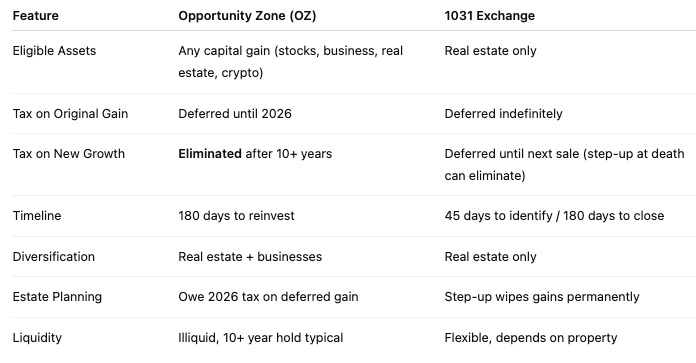For investors sitting on large capital gains, the question isn’t just how much tax do I owe? — it’s how do I keep more of my money working for me? Two powerful strategies often come up in this conversation: Opportunity Zone (OZ) investments and 1031 Exchanges.
While both can help reduce or defer taxes, they work very differently and are suited to different investor profiles.
What Are Opportunity Zones?
Opportunity Zones were created under the 2017 Tax Cuts and Jobs Act to encourage long-term investment in economically distressed areas. By rolling capital gains into a Qualified Opportunity Fund (QOF) within 180 days, investors can unlock three main benefits:
- Deferral of taxes on the original gain until December 31, 2026 (or earlier sale).
- Tax-free appreciation on the new investment if held for at least 10 years.
- Diversification opportunities beyond real estate — QOFs can invest in businesses, infrastructure, and development projects.
💡 Best for investors with gains from stocks, business sales, crypto, or real estate who want long-term, tax-free growth and are comfortable with a 10+ year horizon.
What Are 1031 Exchanges?
A 1031 Exchange allows investors to sell real estate and reinvest the proceeds into another “like-kind” property while deferring capital gains taxes. Key benefits include:
- Full deferral of capital gains and depreciation recapture — as long as you keep exchanging.
- Step-up in basis at death, potentially eliminating all deferred taxes for heirs.
- Flexibility within real estate — from direct ownership to Delaware Statutory Trusts (DSTs).
💡 Best for real estate investors who want indefinite tax deferral, estate planning advantages, and continued exposure to property assets.
How DSTs Work Within a 1031 Exchange
A Delaware Statutory Trust (DST) is a legal entity that owns real estate. Instead of buying and managing an entire property yourself, you purchase a fractional interest in the DST. This interest qualifies as “like-kind” property for a 1031 exchange.
Benefits of a DST in a 1031 Exchange
- Passive ownership: Professional sponsors handle management, tenants, and operations.
- Diversification: Invest in multiple institutional-grade properties (e.g., multifamily, healthcare, industrial).
- Accessibility: Gain exposure to large properties ($50M+) you couldn’t buy on your own.
- Estate planning: Interests can be divided among heirs.
Risks & Considerations
- Illiquidity: DST interests are typically locked until the sponsor sells.
- No control: All decisions rest with the sponsor.
- Fees: Sponsors take management and acquisition fees that reduce net returns.
- Timing risk: Your ability to roll into another 1031 depends on when the DST exits.
💡 DSTs are often a good fit for investors who want 1031 benefits but prefer a hands-off approach.
Side-by-Side Comparison

A Simple Decision Guide
- Gains from stocks, business, or crypto → OZ
- Want tax-free growth after 10+ years → OZ
- Want indefinite deferral & estate step-up → 1031
- Only reinvesting into real estate → 1031
- Want diversification beyond real estate → OZ
- Want real estate exposure but no management headaches → 1031 via DST
- Want more liquidity and control → 1031 (direct ownership)
The Bottom Line
- Opportunity Zones are best for investors who want to diversify beyond real estate and are seeking long-term, tax-free appreciation, even if it means locking up capital for 10+ years.
- 1031 Exchanges are best for real estate investors who want indefinite deferral and powerful estate planning benefits.
- DSTs within a 1031 provide a passive, hands-off solution that still qualifies for tax deferral — ideal for investors who want to stay in real estate but step away from active management.
At Cloud Capital, we help clients evaluate these strategies in the context of their overall wealth plan. It’s not just about saving on taxes — it’s about aligning your capital with your goals, risk tolerance, and timeline.
👉 Thinking about rolling gains into an OZ or 1031 (direct or via DST)?
Let’s explore which strategy fits best for your situation. Contact us to schedule a conversation.
